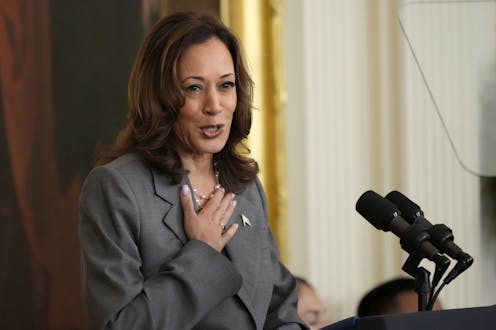Kamala Harris illustrates how complex identity is − and the pressure many multiracial people feel to put themselves in one ‘box’
- Written by Wilson K. Okello, Assistant Professor of Higher Education and Director of the Black Study in Education Lab, Penn State

People sometimes feel pressured to choose one identity over another[1]. Kamala Harris, who is multiracial[2] – her mother is from India and her father is a Black immigrant from Jamaica – illustrates the complexity of defining identity.
Harris is often asked questions about her Black identity[3]. She has responded by saying[4] how it relates to her sense of self. “I’m really clear about who I am, and if anybody else is not, they need to go through their own therapy.”
At the National Association of Black Journalists conference, in July 2024, former president and Republican presidential nominee Donald Trump questioned[5] her Black identity by saying, “Is she Indian or is she Black?”
The question reflected a narrow, either/or approach. As a scholar who draws from the ideas of Black thinkers[6] to explore how society works, I know that identity is not the result of a single decision, but rather the confluence of several factors, such as someone’s environment and socialization.
‘The Truths We Hold’
Harris’ parents, Donald Harris and Shyamala Gopalan, met at the University of California, Berkeley, in the 1960s. They connected through the radical politics of the Black intellectual tradition, finding both community and shared values. As part of a study group[7] and, later, the Afro-American Association, they developed a language to confront civil rights struggles and systemic oppression.
Harris often refers to herself as both African American and Asian American. During the Democratic National Convention[8], she paid tribute to her multiracial background and upbringing.
But in her autobiography, “The Truths We Hold,” Harris explains how her mother was cognizant that some people would see her and her younger sister, Maya, as Black[9], and was “determined to make sure we would grow into confident, proud Black women.”
Harris chose to attend Howard University, a historically Black University, and joined a Black sorority, Alpha Kappa Alpha Sorority Inc. In her autobiography, she highlighted how the values of hard work and social justice were instilled in her by her parents.
Identities are fluid and expanding
Individuals can hold multiple dimensions of identity[11] based on their race, sexual orientation, culture and social class, among others. It is impossible to separate one from another. For example, someone can be Black, a lesbian and a woman at the same time.
Instead, identities inform one another; no one is simply Black, or a woman, or a lesbian, but these social identities compound, forming a unique experience. Furthermore, identity is fluid, and expanding[12]. Your beliefs and values can shift, and so too can the ways in which people define themselves.
In these ways, identity is the work of context and choice[13]. Defining your identity is about deciding not just who you want to be but how you choose to live and show up in the world. It is a complex process of making choices and navigating challenges along the way. For example, somebody navigating the intersection of race and gender might choose to embrace both identities fully, despite external pressures to conform to societal expectations.
Harris’ embrace of her multiracial identity, thus, is the result of things she learned from her parents and the various contexts and communities she inhabited.
Claims to an identity
Historically, there has been a disregard for complex identities[14] that don’t fit into clear categories, driven by fears about preserving white racial purity and protecting associated privileges. So, when Trump questioned Kamala Harris’ racial identity, it was a reminder of the long-standing notion of pressuring someone to choose one identity over another[15].
An example of this is the “one-drop rule” in the United States, where even a small amount of nonwhite ancestry classified a person as nonwhite, reinforcing strict racial boundaries[16]. Dating back to a 1662 Virginia law, the one-drop rule ensured that a single drop of Black blood assigned minority status to mixed-race individuals.
The idea that identity can be simplified to just one thing, such as race, is based on the wrong assumption that these identities never change. It’s worth repeating that Harris is of South Asian and Black descent, and it is her choice to define her racial identity. I believe that any effort to question her on the topic is disingenuous and not grounded in a willingness to engage with the complexity of her identity or anyone else’s either.
References
- ^ choose one identity over another (doi.org)
- ^ Kamala Harris, who is multiracial (theconversation.com)
- ^ Harris is often asked questions about her Black identity (www.politico.com)
- ^ responded by saying (www.iheart.com)
- ^ Donald Trump questioned (www.npr.org)
- ^ a scholar who draws from the ideas of Black thinkers (ed.psu.edu)
- ^ study group (uncpress.org)
- ^ Democratic National Convention (www.pbs.org)
- ^ younger sister, Maya, as Black (www.penguinrandomhouse.com)
- ^ AP Photo/J. Scott Applewhite (newsroom.ap.org)
- ^ multiple dimensions of identity (search.worldcat.org)
- ^ and expanding (nyupress.org)
- ^ context and choice (www.penguinrandomhouse.com)
- ^ there has been a disregard for complex identities (psycnet.apa.org)
- ^ choose one identity over another (psycnet.apa.org)
- ^ reinforcing strict racial boundaries (www.pbs.org)
Authors: Wilson K. Okello, Assistant Professor of Higher Education and Director of the Black Study in Education Lab, Penn State

